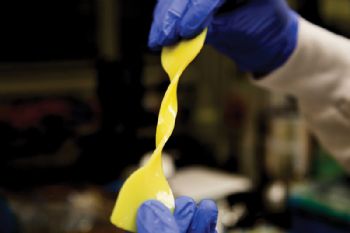
According to an article in
Advanced Materials, research engineers from the University of Michigan in the USA and Jiangnan University in China have been looking at Kevlar in their search for a cartilage replacement; they believe that its ‘bulletproof’ fibres could help to fix medical patients’ knees.
Cartilage performs vital functions in many areas of the body and has ‘unparalleled strength,’ despite being 80% water.
However, synthetic materials have so far failed to match its strength. Artificial replacements undergoing trials have failed to combine the necessary strength with the high water content needed to transport nutrients for cells to survive, the researchers said.
They have considered hydrogels — networks of long flexible molecules that incorporate water and can support the growth of chondrocyte cells necessary for natural cartilage build-up. However, hydrogels tear under a fraction of the strain that cartilage can handle, so the engineering team turned to ultra-strong Kevlar for help.
They combined a network of tough ‘aramid’ fibres, best known for making bulletproof vests, with poly-vinyl alcohol (PVA), which is commonly used in hydrogel cartilage replacements.
The resulting material releases water when under stress and recovers it later like a sponge, mirroring the natural tissue. This property is essential for undergoing the repeated strain encountered in activities such as running.
The researchers say that synthetic cartilage could be a suitable replacement in areas such as the deeper parts of the knee, as it does not harm adjacent cells.
They also hope to use different proportions of aramids and PVA to create other soft tissues that could work in other parts of the body.